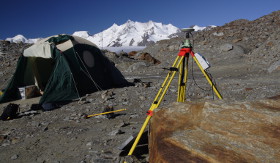
Global Navigation Satellite System (GNSS) receivers capable of positioning accuracies of a few millimetres for precision geodetic surveying.
Full Real-time Kinematic (RTK) capability is also included with all required accessories such as radios, backpacks and poles supplied.
Longer term static monitoring is also possible, with either our solar panels and regulators or your own.
We provide processing software (Leica Infinity) and laptops if required.
Choose a system from the menu on the left to view further details.